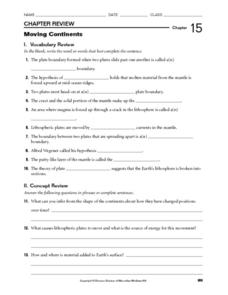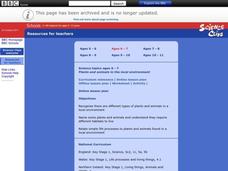Curated OER
Volcanoes
Students explore the formation of volcanoes. In this earth science lesson, students build their own volcanoes in the lab using different materials. They identify the different types of volcanoes.
Curated OER
Balance Stations
Students are introduced to the concept of balance. In groups, they travel between eight stations in which they balance their own body and different types of balls. To end the lesson, they share which one was the hardest and the easiest.
Curated OER
Moving Continents
In this moving continents worksheet, students review the different types of plate boundaries, what causes earthquakes, and where volcanoes are formed. This worksheet has 10 fill in the blank and 9 short answer questions.
Curated OER
What Land Works Best?
Fourth graders explore different types of land. In this land lesson, 4th graders investigate how water, climate, and soil type determine what types of crops may be grown. Students discover these elements while playing an interactive game.
Curated OER
The Goat in the Rug
Students write a personal narrative about something they produce at home. (examples: make a sandwich, clean room, set table, do homework). Students should remember to mention different types of resources and intermediate goods used.
Curated OER
Houses
For this reading comprehension worksheet, students read a passage about the different types of houses around the world. They then answer the 10 questions on the page.
Curated OER
Plants and Animals in the Local Environment
Students recognize the different types of plants and animals living in a local environment. They determine how they require different habitats to live, and relate simple life processes to plants and animals found in local environments.
Curated OER
JUST THROW IT AWAY!
Students different types of reusable trash containers to class. They use the pieces of trash to create something like a bird feeder. They discuss other ways of reusing items to generate less garbage.
Curated OER
Sound and Hearing
Students form an understanding that there are many different types of sound. The core concepts are presented in the most basic form for elementary school. Also students investigate how sound travels.
Curated OER
Energy Resources
In this energy worksheet, students will review the different types of energy and how energy can be created and conserved. This worksheet has 10 matching and 11 short answer questions.
Curated OER
Keeping Warm
Learners investigate how different types of objects act as thermal insulators. In this online lesson plan, students hypothesize how particular objects act as insulators and then complete the online activity to determine which materials...
Curated OER
Pushes and Pulls
Students examine different types of movement and causes that may affect those movements. In this online interactive forces and motion lesson plan, students use toy cars to observe push and pull and then make predictions and collect data...
Curated OER
Fossils
In this fossils worksheet, students review the different types of fossils including index and trace fossils. This worksheet has 6 matching and 9 true or false questions.
Curated OER
Candy Quakes
Eighth graders use candy to show the effects of deformation forces on the earth's crust. In this rock and fossil formation lesson students construct models and simulations to describe and explain natural phenomena.
Curated OER
Petrology in the Gravel Pit
Students are introduced to a wide range of rock types when they examine pebbles and boulders exposed in a gravel pit. Students practice rock description and identification and categorize the rocks sedimentary, igneous, or metamorphic.
Curated OER
Science: What Happens to Create the Lode?
Students understand how mineral deposits are formed and why they are not evenly dispersed. They create and describe three different precipitates from four solutions simulating mineral ore deposit formation in sedimentary rock.
Curated OER
Bricks Soak Up Water
Students determine whether various rocks are porous or not. They conduct an experiment to determine if a brick is porous, calculate how much water the brick soaked up, and develop a conclusion.
Curated OER
Digging in the Dirt
First graders awareness is raised that not all dirt is the same. They compare and observe particle sizes in three different kinds of soils. They keep a record book of what the discover and talk about how some soils are alike and some...
Curated OER
Weathering and Erosion
Students examine the similarities and differences between weathering and erosion. They participate in a lab in which they test the effects of different materials when exposed to weathering and erosion. They record their observations.
Curated OER
Bats
Use Stellaluna by Janell Canon to discuss bats and other types of animals. Learners identify the differences between bats and birds, list the traits of mammals, create a Bat Facts game, and go on a written scavenger hunt. Fun, clever ideas!
Curated OER
Hazards: Fifth Grade Lesson Plans and Activities
After comparing earthquake and volcanic hazards to one another, fifth graders take a closer look at damage associated with a volcanic eruption. They then create a simulation of mudslides due to a volcanic eruption. Using different...
Mathematics Vision Project
Module 6: Congruence, Construction, and Proof
Trace the links between a variety of math concepts in this far-reaching unit. Ideas that seem very different on the outset (like the distance formula and rigid transformations) come together in very natural and logical ways. This unit...
Houghton Mifflin Harcourt
Off to Adventure!: English Language Development Lessons (Theme 1)
Give language skills a boost with a series of ESL lessons in an Off to Adventure! themed unit. Using a speak, listen, move, and look routine, scholars enhance proficiency through grand conversation and skills practice. Discussion topics...
Curated OER
Games around the World
There are three little words every teacher is just dying to hear; investigate, discuss, and play. Kids love those words too, and they'll love finding out what types of things children did for fun long ago. As homework, they interview...

























